ECON 3538: Examining the Impact of Politics on International Trade
VerifiedAdded on 2023/06/14
|10
|2428
|290
Report
AI Summary
This report provides a detailed analysis of the impact of politics on international trade, using BREXIT and American protectionism as key examples. It discusses trade barriers such as tariffs, quotas, and subsidies, and examines how trade policies influence global exchange. The report explores the concept of protectionism, its potential short-term benefits, and long-term drawbacks. It also delves into the impact of political decisions, such as tariffs on steel, and the consequences of BREXIT on UK trade relationships, including the challenges of negotiating new trade agreements. The study concludes that while global trade can empower economies, political factors and protectionist policies significantly shape trade dynamics and can impact economic growth.
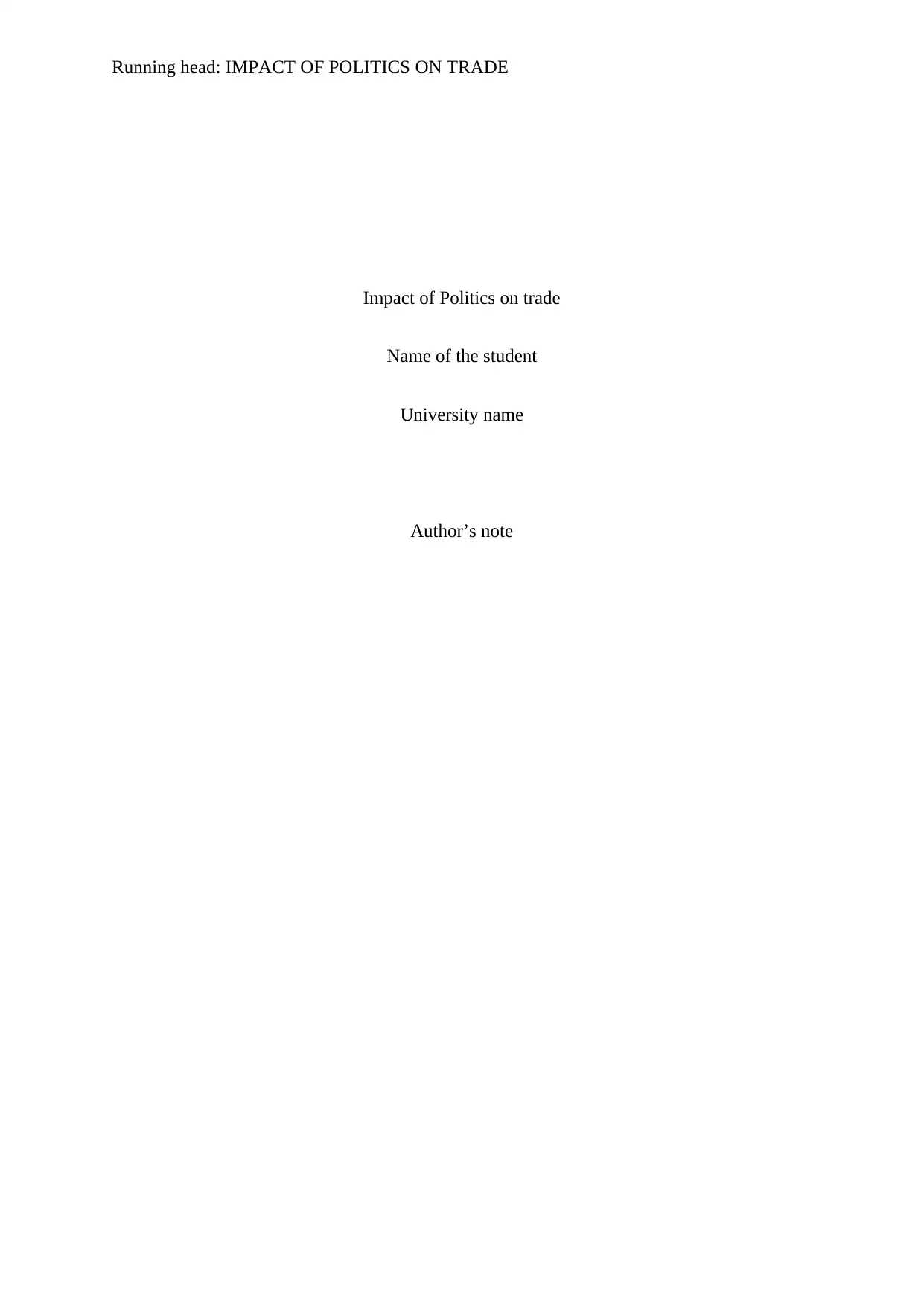
Running head: IMPACT OF POLITICS ON TRADE
Impact of Politics on trade
Name of the student
University name
Author’s note
Impact of Politics on trade
Name of the student
University name
Author’s note
Paraphrase This Document
Need a fresh take? Get an instant paraphrase of this document with our AI Paraphraser
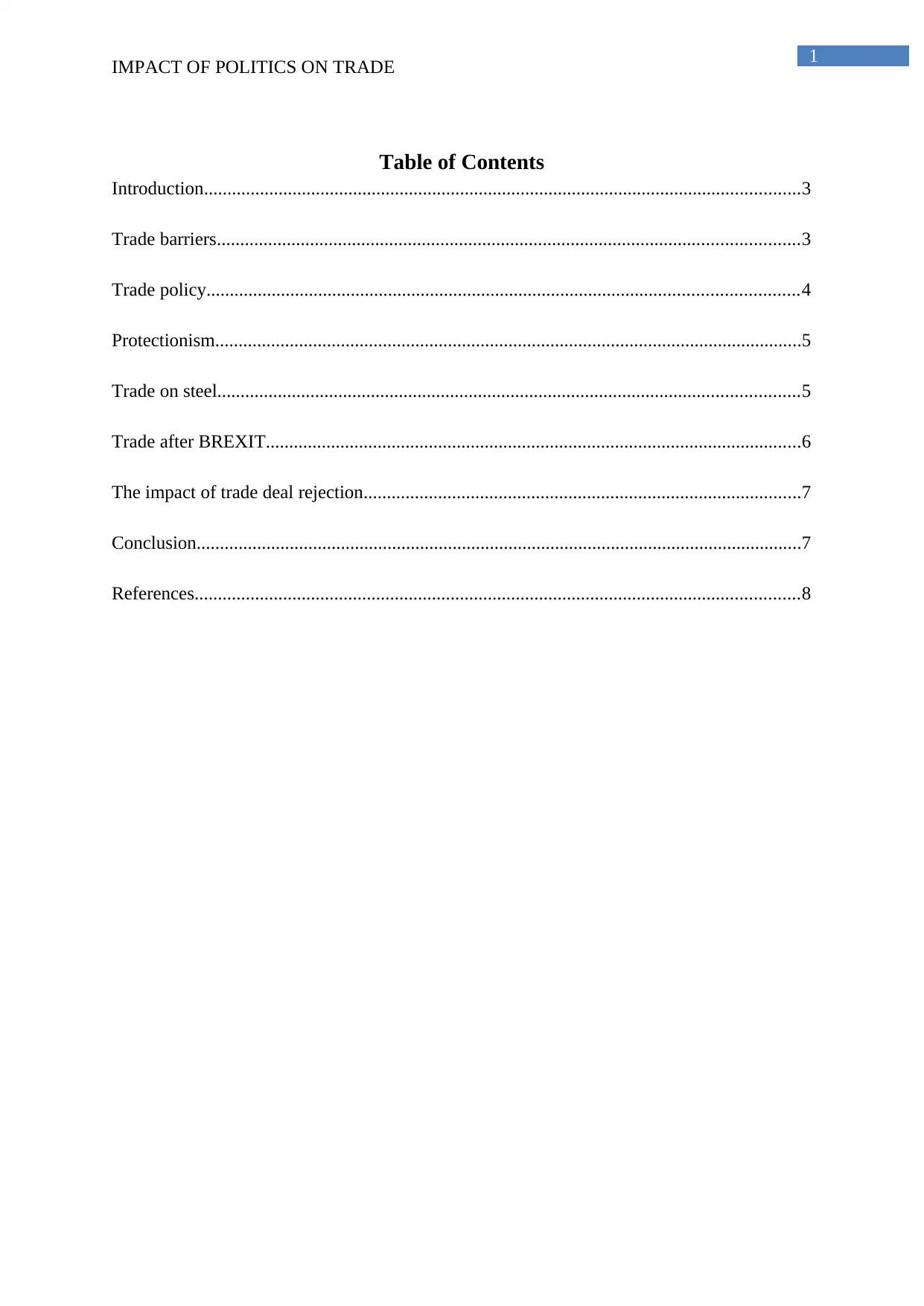
1
IMPACT OF POLITICS ON TRADE
Table of Contents
Introduction................................................................................................................................3
Trade barriers.............................................................................................................................3
Trade policy...............................................................................................................................4
Protectionism..............................................................................................................................5
Trade on steel.............................................................................................................................5
Trade after BREXIT...................................................................................................................6
The impact of trade deal rejection..............................................................................................7
Conclusion..................................................................................................................................7
References..................................................................................................................................8
IMPACT OF POLITICS ON TRADE
Table of Contents
Introduction................................................................................................................................3
Trade barriers.............................................................................................................................3
Trade policy...............................................................................................................................4
Protectionism..............................................................................................................................5
Trade on steel.............................................................................................................................5
Trade after BREXIT...................................................................................................................6
The impact of trade deal rejection..............................................................................................7
Conclusion..................................................................................................................................7
References..................................................................................................................................8
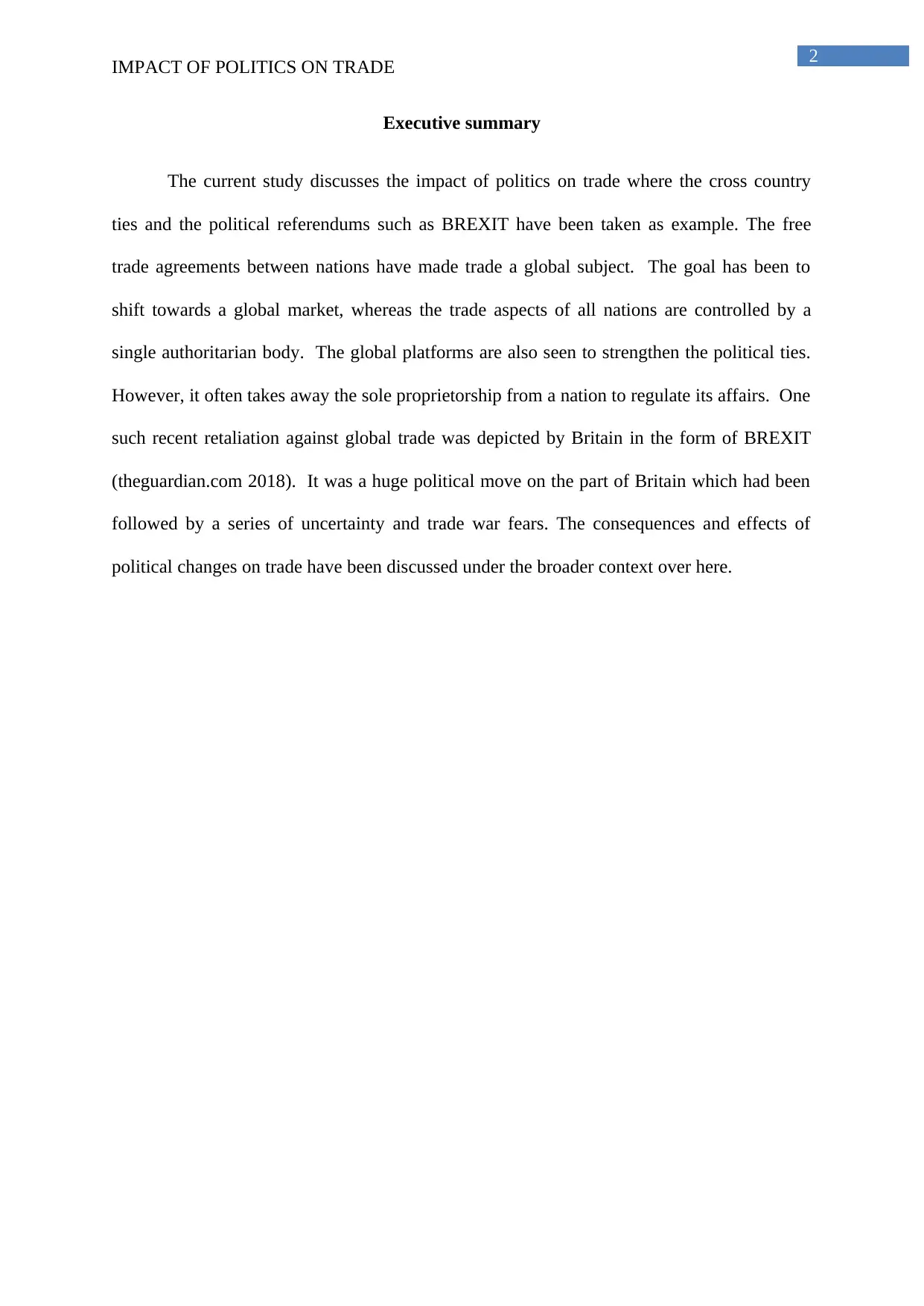
2
IMPACT OF POLITICS ON TRADE
Executive summary
The current study discusses the impact of politics on trade where the cross country
ties and the political referendums such as BREXIT have been taken as example. The free
trade agreements between nations have made trade a global subject. The goal has been to
shift towards a global market, whereas the trade aspects of all nations are controlled by a
single authoritarian body. The global platforms are also seen to strengthen the political ties.
However, it often takes away the sole proprietorship from a nation to regulate its affairs. One
such recent retaliation against global trade was depicted by Britain in the form of BREXIT
(theguardian.com 2018). It was a huge political move on the part of Britain which had been
followed by a series of uncertainty and trade war fears. The consequences and effects of
political changes on trade have been discussed under the broader context over here.
IMPACT OF POLITICS ON TRADE
Executive summary
The current study discusses the impact of politics on trade where the cross country
ties and the political referendums such as BREXIT have been taken as example. The free
trade agreements between nations have made trade a global subject. The goal has been to
shift towards a global market, whereas the trade aspects of all nations are controlled by a
single authoritarian body. The global platforms are also seen to strengthen the political ties.
However, it often takes away the sole proprietorship from a nation to regulate its affairs. One
such recent retaliation against global trade was depicted by Britain in the form of BREXIT
(theguardian.com 2018). It was a huge political move on the part of Britain which had been
followed by a series of uncertainty and trade war fears. The consequences and effects of
political changes on trade have been discussed under the broader context over here.
⊘ This is a preview!⊘
Do you want full access?
Subscribe today to unlock all pages.

Trusted by 1+ million students worldwide
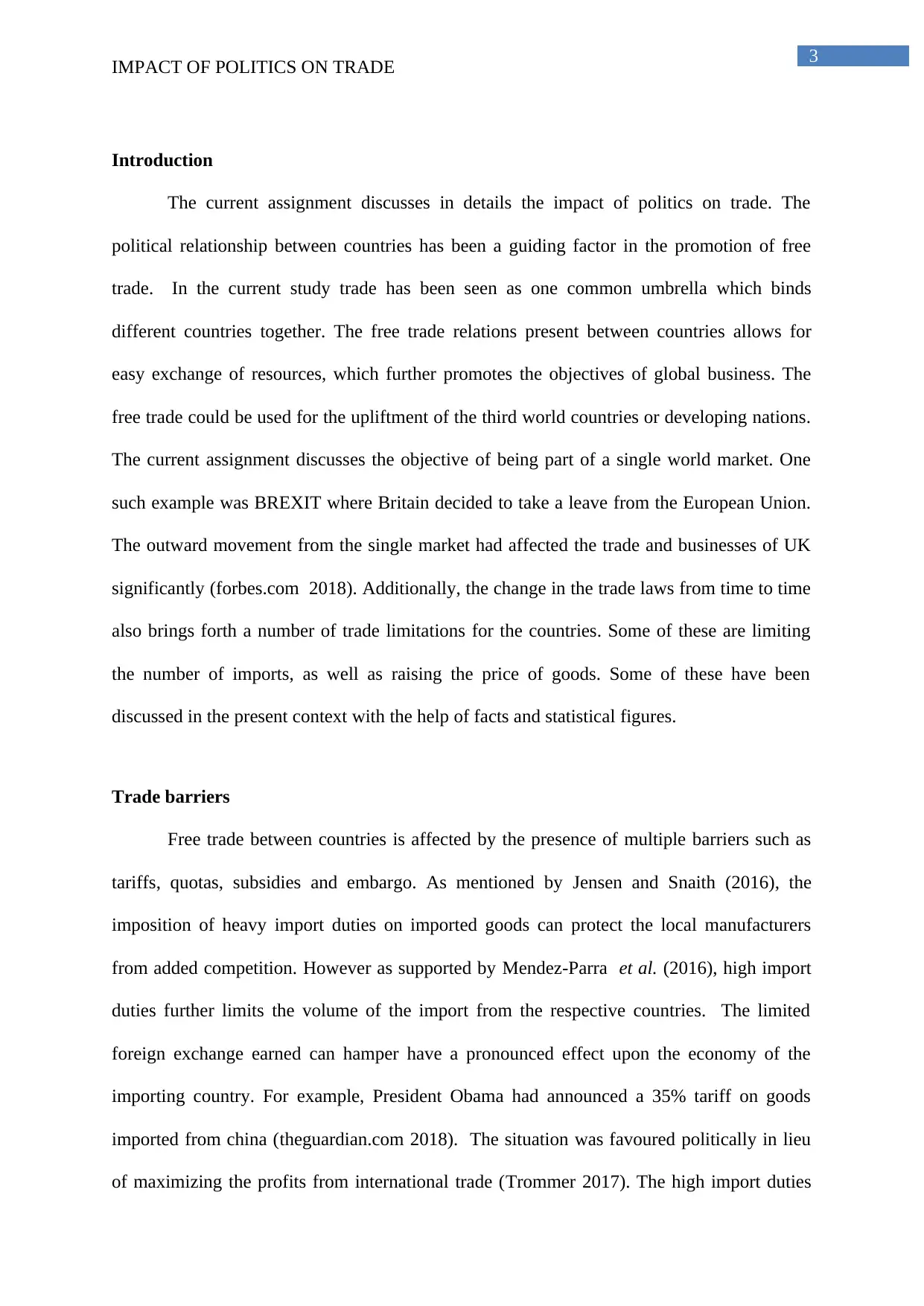
3
IMPACT OF POLITICS ON TRADE
Introduction
The current assignment discusses in details the impact of politics on trade. The
political relationship between countries has been a guiding factor in the promotion of free
trade. In the current study trade has been seen as one common umbrella which binds
different countries together. The free trade relations present between countries allows for
easy exchange of resources, which further promotes the objectives of global business. The
free trade could be used for the upliftment of the third world countries or developing nations.
The current assignment discusses the objective of being part of a single world market. One
such example was BREXIT where Britain decided to take a leave from the European Union.
The outward movement from the single market had affected the trade and businesses of UK
significantly (forbes.com 2018). Additionally, the change in the trade laws from time to time
also brings forth a number of trade limitations for the countries. Some of these are limiting
the number of imports, as well as raising the price of goods. Some of these have been
discussed in the present context with the help of facts and statistical figures.
Trade barriers
Free trade between countries is affected by the presence of multiple barriers such as
tariffs, quotas, subsidies and embargo. As mentioned by Jensen and Snaith (2016), the
imposition of heavy import duties on imported goods can protect the local manufacturers
from added competition. However as supported by Mendez-Parra et al. (2016), high import
duties further limits the volume of the import from the respective countries. The limited
foreign exchange earned can hamper have a pronounced effect upon the economy of the
importing country. For example, President Obama had announced a 35% tariff on goods
imported from china (theguardian.com 2018). The situation was favoured politically in lieu
of maximizing the profits from international trade (Trommer 2017). The high import duties
IMPACT OF POLITICS ON TRADE
Introduction
The current assignment discusses in details the impact of politics on trade. The
political relationship between countries has been a guiding factor in the promotion of free
trade. In the current study trade has been seen as one common umbrella which binds
different countries together. The free trade relations present between countries allows for
easy exchange of resources, which further promotes the objectives of global business. The
free trade could be used for the upliftment of the third world countries or developing nations.
The current assignment discusses the objective of being part of a single world market. One
such example was BREXIT where Britain decided to take a leave from the European Union.
The outward movement from the single market had affected the trade and businesses of UK
significantly (forbes.com 2018). Additionally, the change in the trade laws from time to time
also brings forth a number of trade limitations for the countries. Some of these are limiting
the number of imports, as well as raising the price of goods. Some of these have been
discussed in the present context with the help of facts and statistical figures.
Trade barriers
Free trade between countries is affected by the presence of multiple barriers such as
tariffs, quotas, subsidies and embargo. As mentioned by Jensen and Snaith (2016), the
imposition of heavy import duties on imported goods can protect the local manufacturers
from added competition. However as supported by Mendez-Parra et al. (2016), high import
duties further limits the volume of the import from the respective countries. The limited
foreign exchange earned can hamper have a pronounced effect upon the economy of the
importing country. For example, President Obama had announced a 35% tariff on goods
imported from china (theguardian.com 2018). The situation was favoured politically in lieu
of maximizing the profits from international trade (Trommer 2017). The high import duties
Paraphrase This Document
Need a fresh take? Get an instant paraphrase of this document with our AI Paraphraser
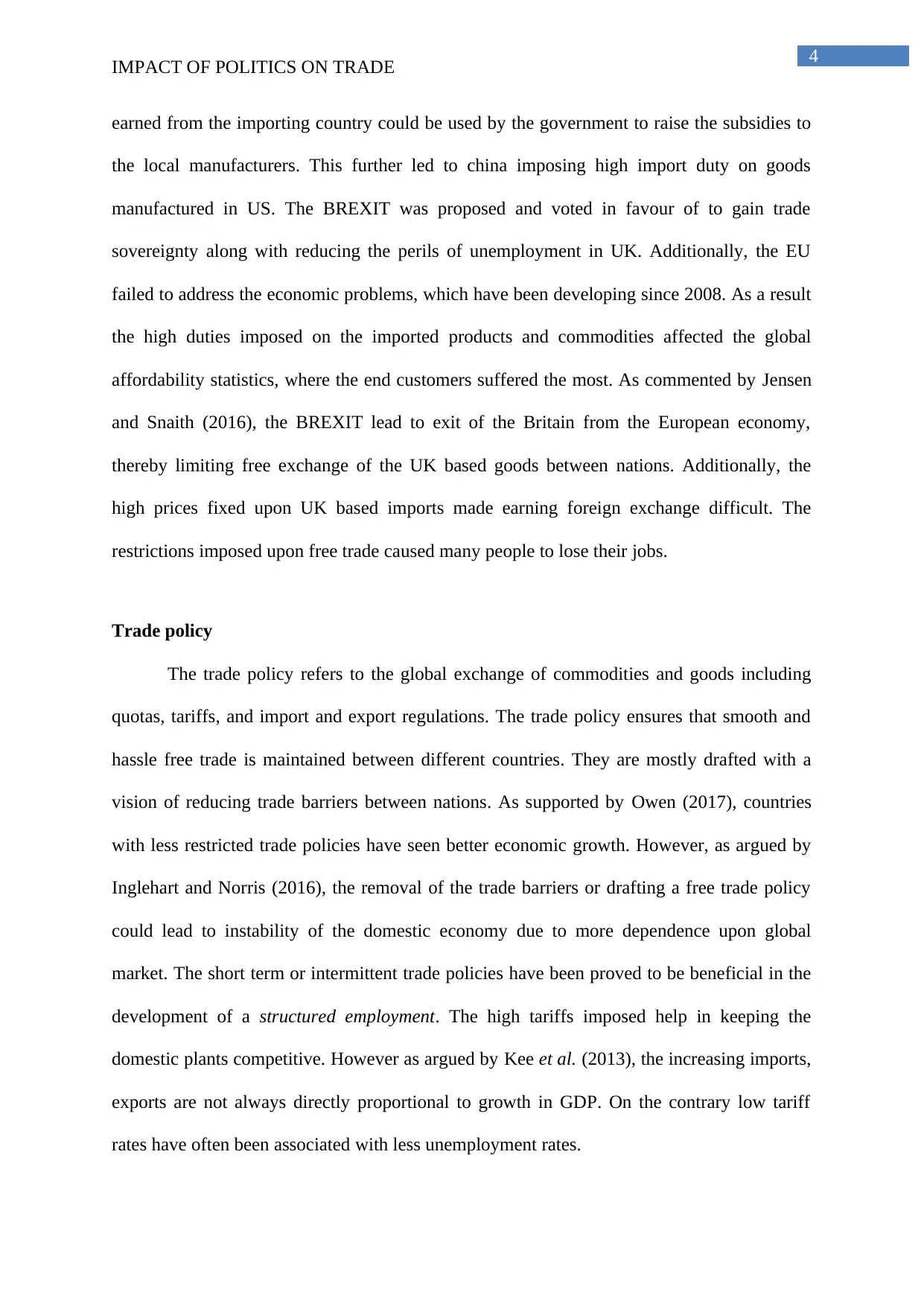
4
IMPACT OF POLITICS ON TRADE
earned from the importing country could be used by the government to raise the subsidies to
the local manufacturers. This further led to china imposing high import duty on goods
manufactured in US. The BREXIT was proposed and voted in favour of to gain trade
sovereignty along with reducing the perils of unemployment in UK. Additionally, the EU
failed to address the economic problems, which have been developing since 2008. As a result
the high duties imposed on the imported products and commodities affected the global
affordability statistics, where the end customers suffered the most. As commented by Jensen
and Snaith (2016), the BREXIT lead to exit of the Britain from the European economy,
thereby limiting free exchange of the UK based goods between nations. Additionally, the
high prices fixed upon UK based imports made earning foreign exchange difficult. The
restrictions imposed upon free trade caused many people to lose their jobs.
Trade policy
The trade policy refers to the global exchange of commodities and goods including
quotas, tariffs, and import and export regulations. The trade policy ensures that smooth and
hassle free trade is maintained between different countries. They are mostly drafted with a
vision of reducing trade barriers between nations. As supported by Owen (2017), countries
with less restricted trade policies have seen better economic growth. However, as argued by
Inglehart and Norris (2016), the removal of the trade barriers or drafting a free trade policy
could lead to instability of the domestic economy due to more dependence upon global
market. The short term or intermittent trade policies have been proved to be beneficial in the
development of a structured employment. The high tariffs imposed help in keeping the
domestic plants competitive. However as argued by Kee et al. (2013), the increasing imports,
exports are not always directly proportional to growth in GDP. On the contrary low tariff
rates have often been associated with less unemployment rates.
IMPACT OF POLITICS ON TRADE
earned from the importing country could be used by the government to raise the subsidies to
the local manufacturers. This further led to china imposing high import duty on goods
manufactured in US. The BREXIT was proposed and voted in favour of to gain trade
sovereignty along with reducing the perils of unemployment in UK. Additionally, the EU
failed to address the economic problems, which have been developing since 2008. As a result
the high duties imposed on the imported products and commodities affected the global
affordability statistics, where the end customers suffered the most. As commented by Jensen
and Snaith (2016), the BREXIT lead to exit of the Britain from the European economy,
thereby limiting free exchange of the UK based goods between nations. Additionally, the
high prices fixed upon UK based imports made earning foreign exchange difficult. The
restrictions imposed upon free trade caused many people to lose their jobs.
Trade policy
The trade policy refers to the global exchange of commodities and goods including
quotas, tariffs, and import and export regulations. The trade policy ensures that smooth and
hassle free trade is maintained between different countries. They are mostly drafted with a
vision of reducing trade barriers between nations. As supported by Owen (2017), countries
with less restricted trade policies have seen better economic growth. However, as argued by
Inglehart and Norris (2016), the removal of the trade barriers or drafting a free trade policy
could lead to instability of the domestic economy due to more dependence upon global
market. The short term or intermittent trade policies have been proved to be beneficial in the
development of a structured employment. The high tariffs imposed help in keeping the
domestic plants competitive. However as argued by Kee et al. (2013), the increasing imports,
exports are not always directly proportional to growth in GDP. On the contrary low tariff
rates have often been associated with less unemployment rates.
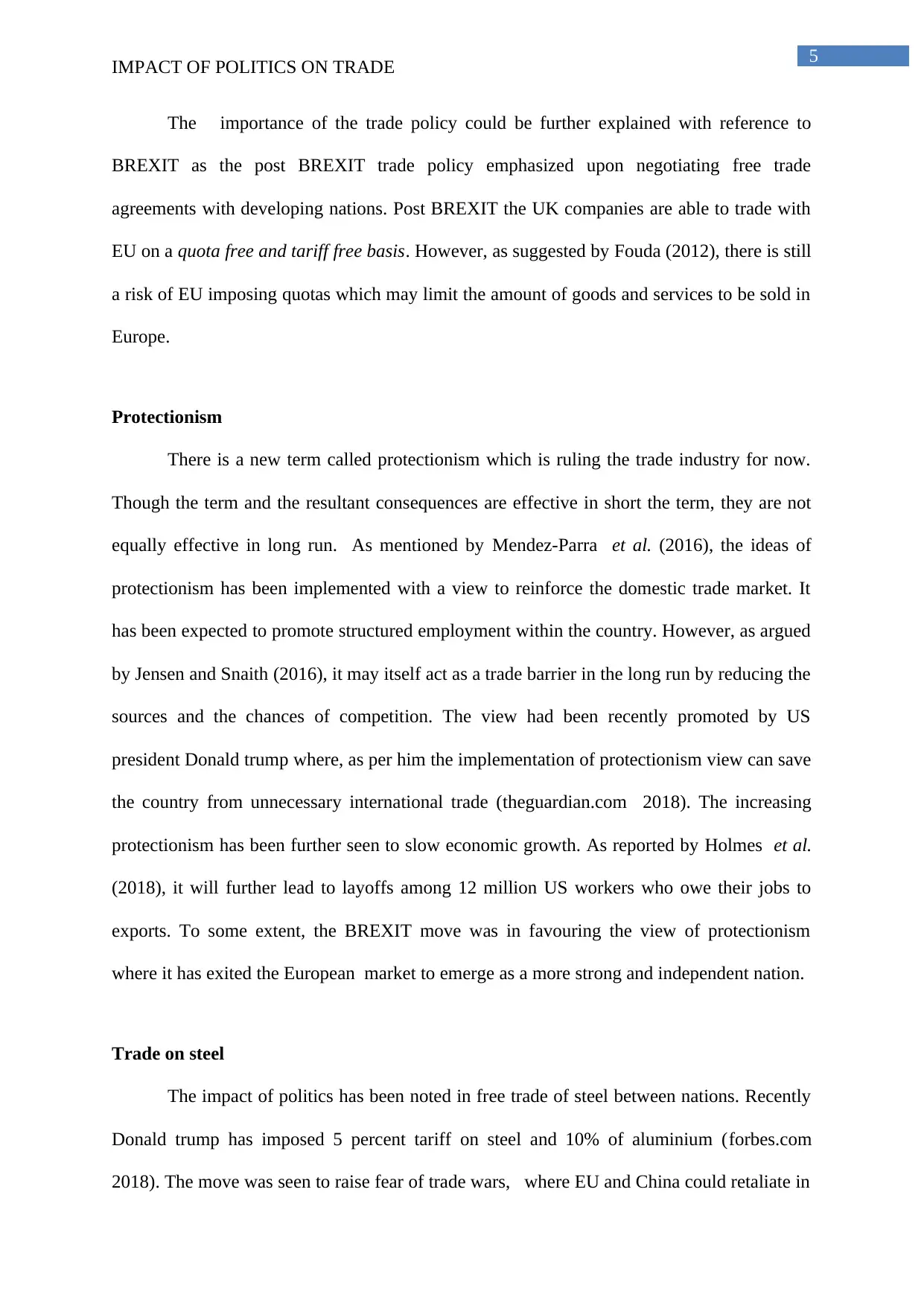
5
IMPACT OF POLITICS ON TRADE
The importance of the trade policy could be further explained with reference to
BREXIT as the post BREXIT trade policy emphasized upon negotiating free trade
agreements with developing nations. Post BREXIT the UK companies are able to trade with
EU on a quota free and tariff free basis. However, as suggested by Fouda (2012), there is still
a risk of EU imposing quotas which may limit the amount of goods and services to be sold in
Europe.
Protectionism
There is a new term called protectionism which is ruling the trade industry for now.
Though the term and the resultant consequences are effective in short the term, they are not
equally effective in long run. As mentioned by Mendez-Parra et al. (2016), the ideas of
protectionism has been implemented with a view to reinforce the domestic trade market. It
has been expected to promote structured employment within the country. However, as argued
by Jensen and Snaith (2016), it may itself act as a trade barrier in the long run by reducing the
sources and the chances of competition. The view had been recently promoted by US
president Donald trump where, as per him the implementation of protectionism view can save
the country from unnecessary international trade (theguardian.com 2018). The increasing
protectionism has been further seen to slow economic growth. As reported by Holmes et al.
(2018), it will further lead to layoffs among 12 million US workers who owe their jobs to
exports. To some extent, the BREXIT move was in favouring the view of protectionism
where it has exited the European market to emerge as a more strong and independent nation.
Trade on steel
The impact of politics has been noted in free trade of steel between nations. Recently
Donald trump has imposed 5 percent tariff on steel and 10% of aluminium (forbes.com
2018). The move was seen to raise fear of trade wars, where EU and China could retaliate in
IMPACT OF POLITICS ON TRADE
The importance of the trade policy could be further explained with reference to
BREXIT as the post BREXIT trade policy emphasized upon negotiating free trade
agreements with developing nations. Post BREXIT the UK companies are able to trade with
EU on a quota free and tariff free basis. However, as suggested by Fouda (2012), there is still
a risk of EU imposing quotas which may limit the amount of goods and services to be sold in
Europe.
Protectionism
There is a new term called protectionism which is ruling the trade industry for now.
Though the term and the resultant consequences are effective in short the term, they are not
equally effective in long run. As mentioned by Mendez-Parra et al. (2016), the ideas of
protectionism has been implemented with a view to reinforce the domestic trade market. It
has been expected to promote structured employment within the country. However, as argued
by Jensen and Snaith (2016), it may itself act as a trade barrier in the long run by reducing the
sources and the chances of competition. The view had been recently promoted by US
president Donald trump where, as per him the implementation of protectionism view can save
the country from unnecessary international trade (theguardian.com 2018). The increasing
protectionism has been further seen to slow economic growth. As reported by Holmes et al.
(2018), it will further lead to layoffs among 12 million US workers who owe their jobs to
exports. To some extent, the BREXIT move was in favouring the view of protectionism
where it has exited the European market to emerge as a more strong and independent nation.
Trade on steel
The impact of politics has been noted in free trade of steel between nations. Recently
Donald trump has imposed 5 percent tariff on steel and 10% of aluminium (forbes.com
2018). The move was seen to raise fear of trade wars, where EU and China could retaliate in
⊘ This is a preview!⊘
Do you want full access?
Subscribe today to unlock all pages.

Trusted by 1+ million students worldwide
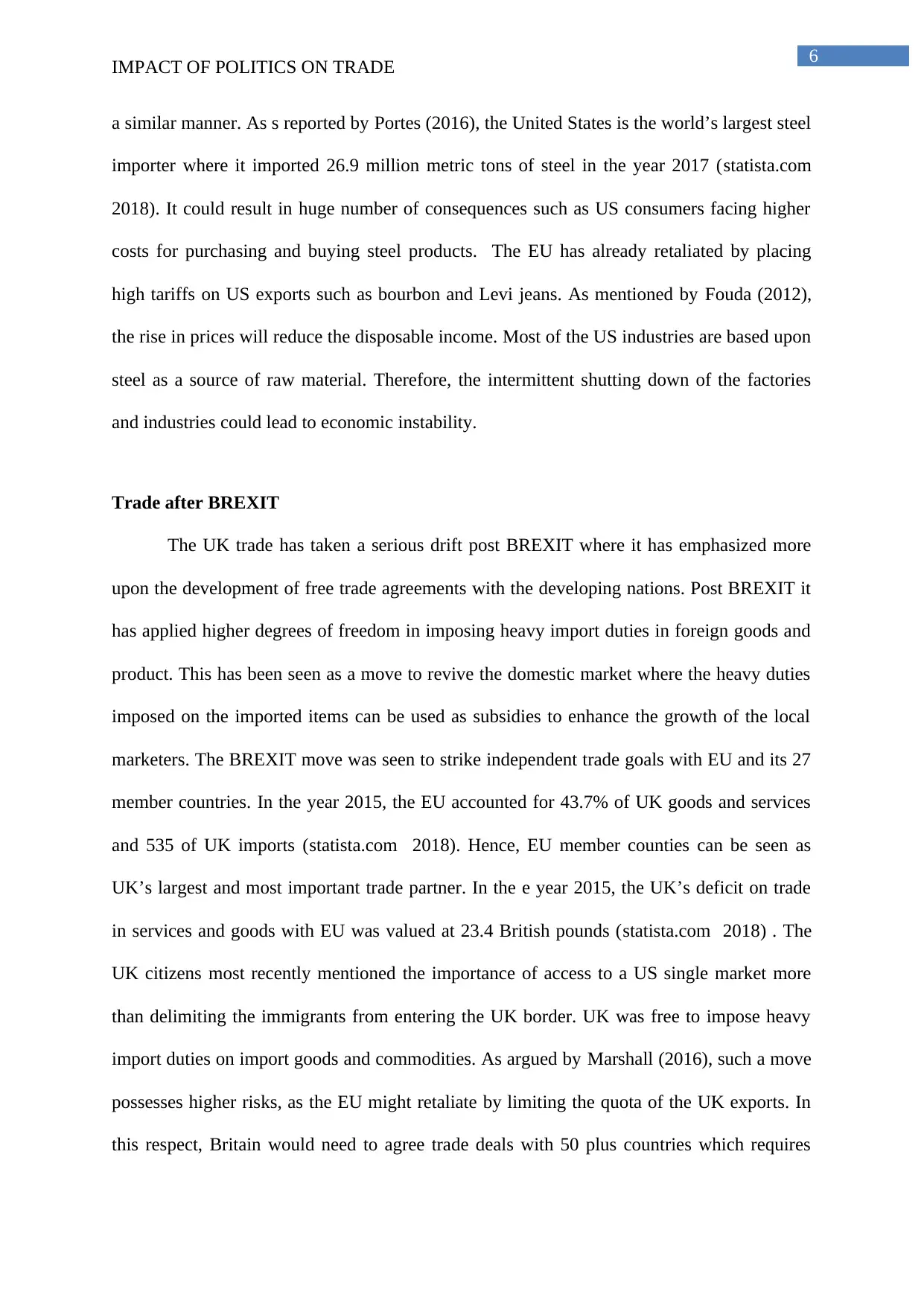
6
IMPACT OF POLITICS ON TRADE
a similar manner. As s reported by Portes (2016), the United States is the world’s largest steel
importer where it imported 26.9 million metric tons of steel in the year 2017 (statista.com
2018). It could result in huge number of consequences such as US consumers facing higher
costs for purchasing and buying steel products. The EU has already retaliated by placing
high tariffs on US exports such as bourbon and Levi jeans. As mentioned by Fouda (2012),
the rise in prices will reduce the disposable income. Most of the US industries are based upon
steel as a source of raw material. Therefore, the intermittent shutting down of the factories
and industries could lead to economic instability.
Trade after BREXIT
The UK trade has taken a serious drift post BREXIT where it has emphasized more
upon the development of free trade agreements with the developing nations. Post BREXIT it
has applied higher degrees of freedom in imposing heavy import duties in foreign goods and
product. This has been seen as a move to revive the domestic market where the heavy duties
imposed on the imported items can be used as subsidies to enhance the growth of the local
marketers. The BREXIT move was seen to strike independent trade goals with EU and its 27
member countries. In the year 2015, the EU accounted for 43.7% of UK goods and services
and 535 of UK imports (statista.com 2018). Hence, EU member counties can be seen as
UK’s largest and most important trade partner. In the e year 2015, the UK’s deficit on trade
in services and goods with EU was valued at 23.4 British pounds (statista.com 2018) . The
UK citizens most recently mentioned the importance of access to a US single market more
than delimiting the immigrants from entering the UK border. UK was free to impose heavy
import duties on import goods and commodities. As argued by Marshall (2016), such a move
possesses higher risks, as the EU might retaliate by limiting the quota of the UK exports. In
this respect, Britain would need to agree trade deals with 50 plus countries which requires
IMPACT OF POLITICS ON TRADE
a similar manner. As s reported by Portes (2016), the United States is the world’s largest steel
importer where it imported 26.9 million metric tons of steel in the year 2017 (statista.com
2018). It could result in huge number of consequences such as US consumers facing higher
costs for purchasing and buying steel products. The EU has already retaliated by placing
high tariffs on US exports such as bourbon and Levi jeans. As mentioned by Fouda (2012),
the rise in prices will reduce the disposable income. Most of the US industries are based upon
steel as a source of raw material. Therefore, the intermittent shutting down of the factories
and industries could lead to economic instability.
Trade after BREXIT
The UK trade has taken a serious drift post BREXIT where it has emphasized more
upon the development of free trade agreements with the developing nations. Post BREXIT it
has applied higher degrees of freedom in imposing heavy import duties in foreign goods and
product. This has been seen as a move to revive the domestic market where the heavy duties
imposed on the imported items can be used as subsidies to enhance the growth of the local
marketers. The BREXIT move was seen to strike independent trade goals with EU and its 27
member countries. In the year 2015, the EU accounted for 43.7% of UK goods and services
and 535 of UK imports (statista.com 2018). Hence, EU member counties can be seen as
UK’s largest and most important trade partner. In the e year 2015, the UK’s deficit on trade
in services and goods with EU was valued at 23.4 British pounds (statista.com 2018) . The
UK citizens most recently mentioned the importance of access to a US single market more
than delimiting the immigrants from entering the UK border. UK was free to impose heavy
import duties on import goods and commodities. As argued by Marshall (2016), such a move
possesses higher risks, as the EU might retaliate by limiting the quota of the UK exports. In
this respect, Britain would need to agree trade deals with 50 plus countries which requires
Paraphrase This Document
Need a fresh take? Get an instant paraphrase of this document with our AI Paraphraser
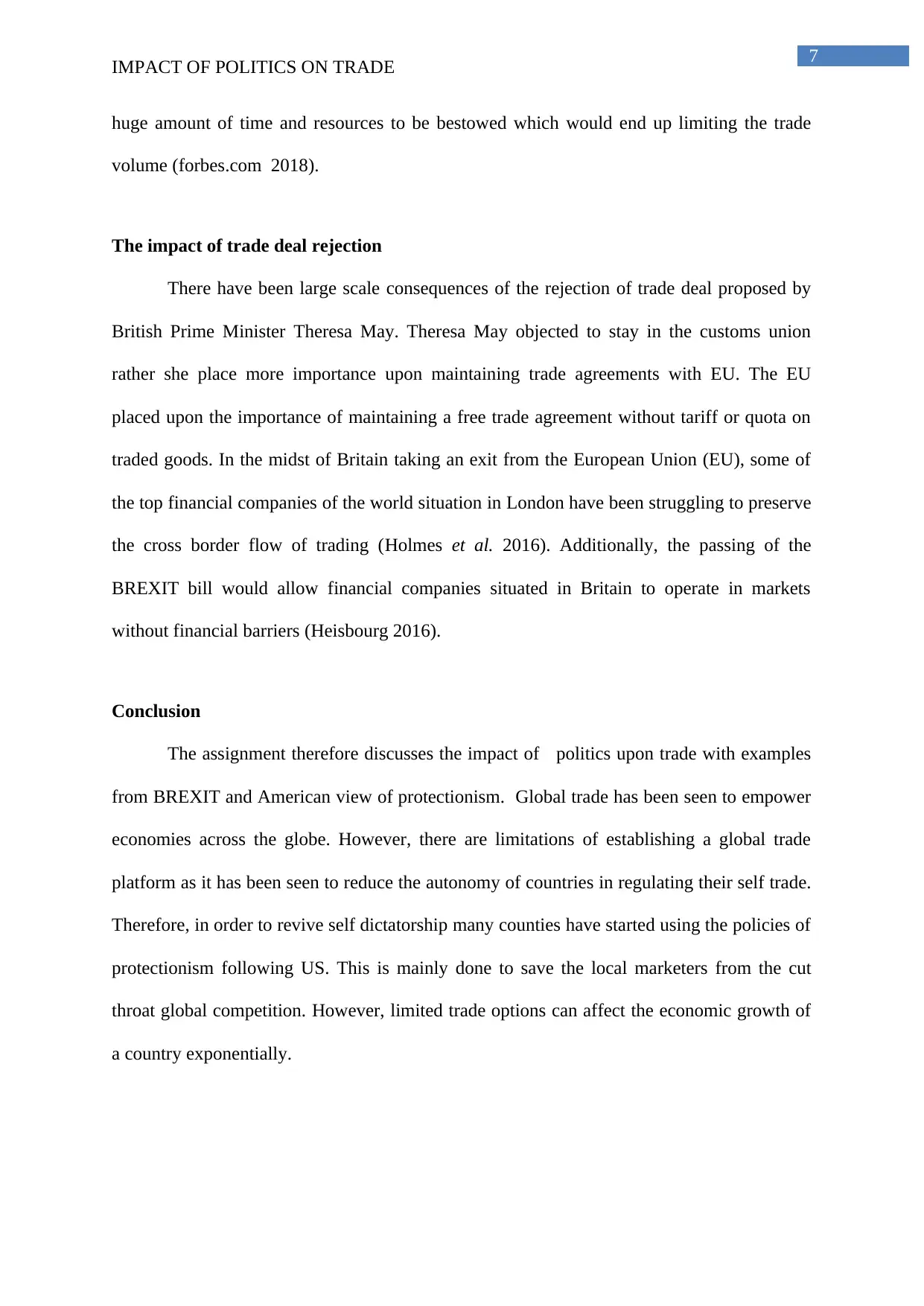
7
IMPACT OF POLITICS ON TRADE
huge amount of time and resources to be bestowed which would end up limiting the trade
volume (forbes.com 2018).
The impact of trade deal rejection
There have been large scale consequences of the rejection of trade deal proposed by
British Prime Minister Theresa May. Theresa May objected to stay in the customs union
rather she place more importance upon maintaining trade agreements with EU. The EU
placed upon the importance of maintaining a free trade agreement without tariff or quota on
traded goods. In the midst of Britain taking an exit from the European Union (EU), some of
the top financial companies of the world situation in London have been struggling to preserve
the cross border flow of trading (Holmes et al. 2016). Additionally, the passing of the
BREXIT bill would allow financial companies situated in Britain to operate in markets
without financial barriers (Heisbourg 2016).
Conclusion
The assignment therefore discusses the impact of politics upon trade with examples
from BREXIT and American view of protectionism. Global trade has been seen to empower
economies across the globe. However, there are limitations of establishing a global trade
platform as it has been seen to reduce the autonomy of countries in regulating their self trade.
Therefore, in order to revive self dictatorship many counties have started using the policies of
protectionism following US. This is mainly done to save the local marketers from the cut
throat global competition. However, limited trade options can affect the economic growth of
a country exponentially.
IMPACT OF POLITICS ON TRADE
huge amount of time and resources to be bestowed which would end up limiting the trade
volume (forbes.com 2018).
The impact of trade deal rejection
There have been large scale consequences of the rejection of trade deal proposed by
British Prime Minister Theresa May. Theresa May objected to stay in the customs union
rather she place more importance upon maintaining trade agreements with EU. The EU
placed upon the importance of maintaining a free trade agreement without tariff or quota on
traded goods. In the midst of Britain taking an exit from the European Union (EU), some of
the top financial companies of the world situation in London have been struggling to preserve
the cross border flow of trading (Holmes et al. 2016). Additionally, the passing of the
BREXIT bill would allow financial companies situated in Britain to operate in markets
without financial barriers (Heisbourg 2016).
Conclusion
The assignment therefore discusses the impact of politics upon trade with examples
from BREXIT and American view of protectionism. Global trade has been seen to empower
economies across the globe. However, there are limitations of establishing a global trade
platform as it has been seen to reduce the autonomy of countries in regulating their self trade.
Therefore, in order to revive self dictatorship many counties have started using the policies of
protectionism following US. This is mainly done to save the local marketers from the cut
throat global competition. However, limited trade options can affect the economic growth of
a country exponentially.
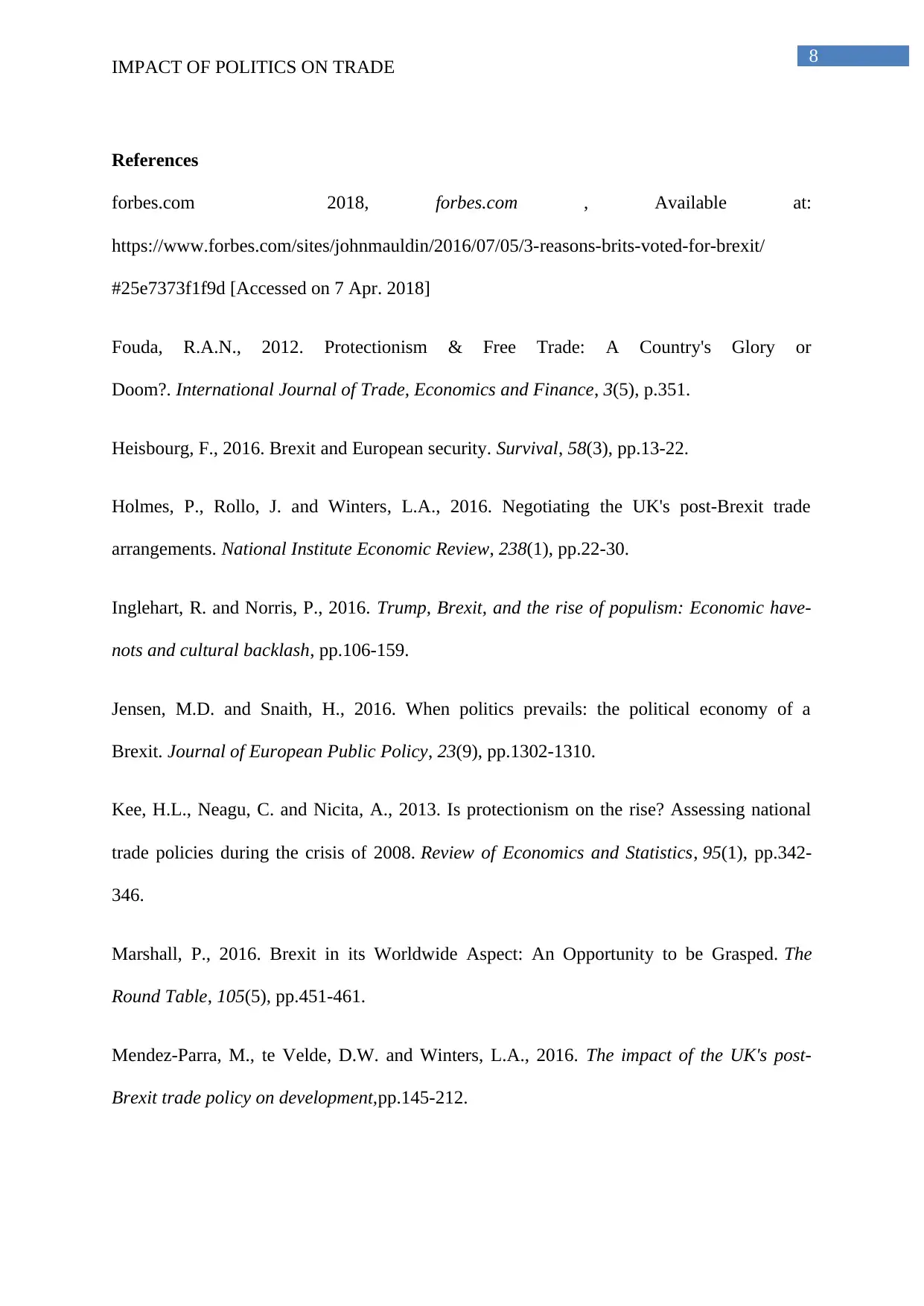
8
IMPACT OF POLITICS ON TRADE
References
forbes.com 2018, forbes.com , Available at:
https://www.forbes.com/sites/johnmauldin/2016/07/05/3-reasons-brits-voted-for-brexit/
#25e7373f1f9d [Accessed on 7 Apr. 2018]
Fouda, R.A.N., 2012. Protectionism & Free Trade: A Country's Glory or
Doom?. International Journal of Trade, Economics and Finance, 3(5), p.351.
Heisbourg, F., 2016. Brexit and European security. Survival, 58(3), pp.13-22.
Holmes, P., Rollo, J. and Winters, L.A., 2016. Negotiating the UK's post-Brexit trade
arrangements. National Institute Economic Review, 238(1), pp.22-30.
Inglehart, R. and Norris, P., 2016. Trump, Brexit, and the rise of populism: Economic have-
nots and cultural backlash, pp.106-159.
Jensen, M.D. and Snaith, H., 2016. When politics prevails: the political economy of a
Brexit. Journal of European Public Policy, 23(9), pp.1302-1310.
Kee, H.L., Neagu, C. and Nicita, A., 2013. Is protectionism on the rise? Assessing national
trade policies during the crisis of 2008. Review of Economics and Statistics, 95(1), pp.342-
346.
Marshall, P., 2016. Brexit in its Worldwide Aspect: An Opportunity to be Grasped. The
Round Table, 105(5), pp.451-461.
Mendez-Parra, M., te Velde, D.W. and Winters, L.A., 2016. The impact of the UK's post-
Brexit trade policy on development,pp.145-212.
IMPACT OF POLITICS ON TRADE
References
forbes.com 2018, forbes.com , Available at:
https://www.forbes.com/sites/johnmauldin/2016/07/05/3-reasons-brits-voted-for-brexit/
#25e7373f1f9d [Accessed on 7 Apr. 2018]
Fouda, R.A.N., 2012. Protectionism & Free Trade: A Country's Glory or
Doom?. International Journal of Trade, Economics and Finance, 3(5), p.351.
Heisbourg, F., 2016. Brexit and European security. Survival, 58(3), pp.13-22.
Holmes, P., Rollo, J. and Winters, L.A., 2016. Negotiating the UK's post-Brexit trade
arrangements. National Institute Economic Review, 238(1), pp.22-30.
Inglehart, R. and Norris, P., 2016. Trump, Brexit, and the rise of populism: Economic have-
nots and cultural backlash, pp.106-159.
Jensen, M.D. and Snaith, H., 2016. When politics prevails: the political economy of a
Brexit. Journal of European Public Policy, 23(9), pp.1302-1310.
Kee, H.L., Neagu, C. and Nicita, A., 2013. Is protectionism on the rise? Assessing national
trade policies during the crisis of 2008. Review of Economics and Statistics, 95(1), pp.342-
346.
Marshall, P., 2016. Brexit in its Worldwide Aspect: An Opportunity to be Grasped. The
Round Table, 105(5), pp.451-461.
Mendez-Parra, M., te Velde, D.W. and Winters, L.A., 2016. The impact of the UK's post-
Brexit trade policy on development,pp.145-212.
⊘ This is a preview!⊘
Do you want full access?
Subscribe today to unlock all pages.

Trusted by 1+ million students worldwide
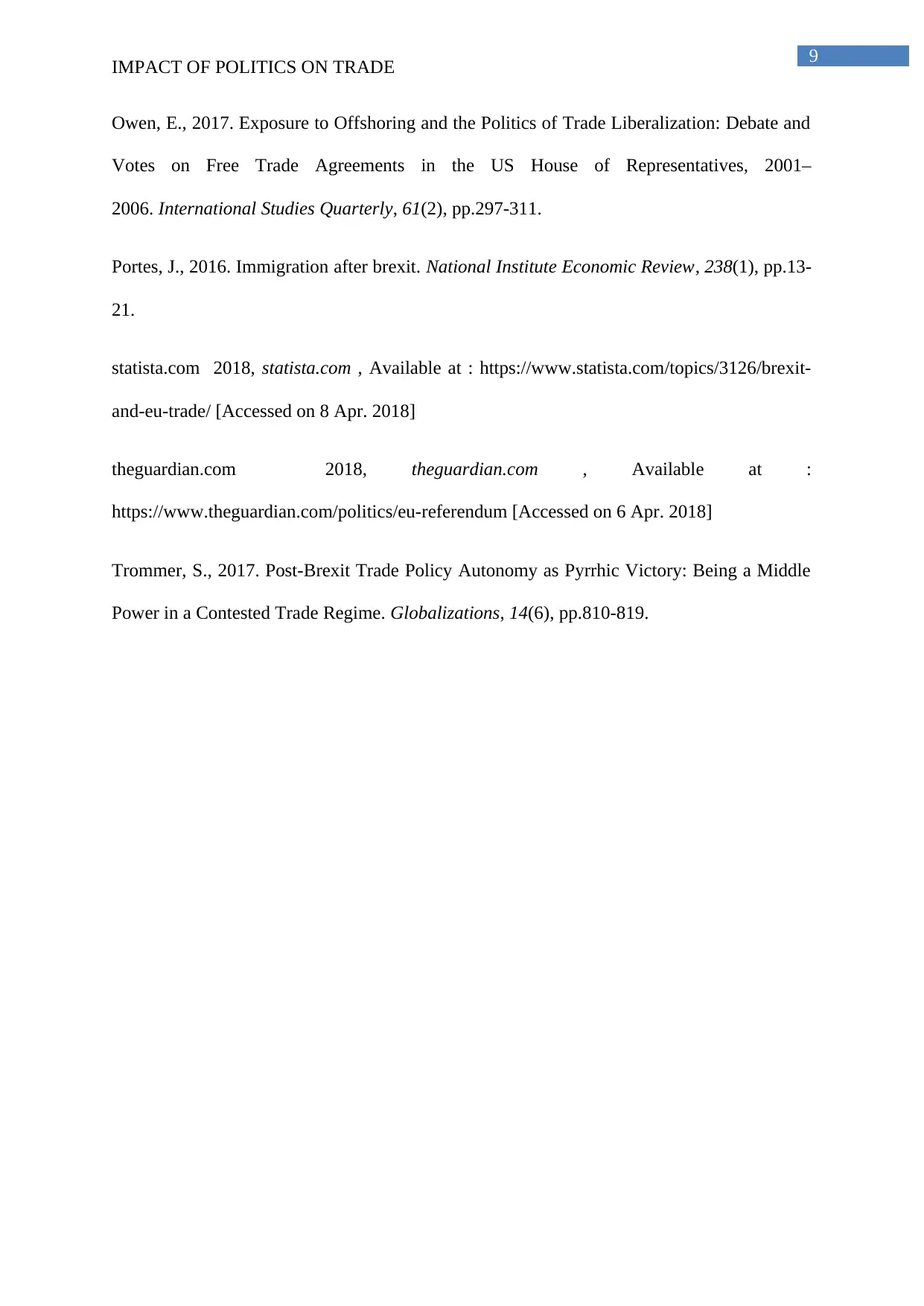
9
IMPACT OF POLITICS ON TRADE
Owen, E., 2017. Exposure to Offshoring and the Politics of Trade Liberalization: Debate and
Votes on Free Trade Agreements in the US House of Representatives, 2001–
2006. International Studies Quarterly, 61(2), pp.297-311.
Portes, J., 2016. Immigration after brexit. National Institute Economic Review, 238(1), pp.13-
21.
statista.com 2018, statista.com , Available at : https://www.statista.com/topics/3126/brexit-
and-eu-trade/ [Accessed on 8 Apr. 2018]
theguardian.com 2018, theguardian.com , Available at :
https://www.theguardian.com/politics/eu-referendum [Accessed on 6 Apr. 2018]
Trommer, S., 2017. Post-Brexit Trade Policy Autonomy as Pyrrhic Victory: Being a Middle
Power in a Contested Trade Regime. Globalizations, 14(6), pp.810-819.
IMPACT OF POLITICS ON TRADE
Owen, E., 2017. Exposure to Offshoring and the Politics of Trade Liberalization: Debate and
Votes on Free Trade Agreements in the US House of Representatives, 2001–
2006. International Studies Quarterly, 61(2), pp.297-311.
Portes, J., 2016. Immigration after brexit. National Institute Economic Review, 238(1), pp.13-
21.
statista.com 2018, statista.com , Available at : https://www.statista.com/topics/3126/brexit-
and-eu-trade/ [Accessed on 8 Apr. 2018]
theguardian.com 2018, theguardian.com , Available at :
https://www.theguardian.com/politics/eu-referendum [Accessed on 6 Apr. 2018]
Trommer, S., 2017. Post-Brexit Trade Policy Autonomy as Pyrrhic Victory: Being a Middle
Power in a Contested Trade Regime. Globalizations, 14(6), pp.810-819.
1 out of 10
Related Documents
Your All-in-One AI-Powered Toolkit for Academic Success.
+13062052269
info@desklib.com
Available 24*7 on WhatsApp / Email
![[object Object]](/_next/static/media/star-bottom.7253800d.svg)
Unlock your academic potential
Copyright © 2020–2026 A2Z Services. All Rights Reserved. Developed and managed by ZUCOL.





